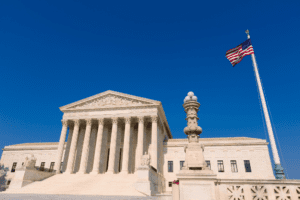 Justice Breyer continued: As it did over 100 years ago, New York’s law today continues to require individuals to obtain a license before carrying a concealed handgun in public. N. Y. Penal Law Ann. §400.00(2); Kachalsky, 701 F. 3d, at 85–86. Because the State does not allow the open carriage of handguns at all, a concealed-carry license is the only way to legally carry a handgun in public. Id., at 86. This licensing requirement applies only to handguns (i.e., “pistols and revolvers”) and short-barreled rifles and shotguns, not to all types of firearms. Id., at 85. For instance, the State does not require a license to carry a long gun (i.e., a rifle or a shotgun over a certain length) in public. Ibid.; §265.00(3) (West 2022). To obtain a concealed-carry license for a handgun, an applicant must satisfy certain eligibility criteria. Among other things, he must generally be at least 21 years old and of “good moral character.” §400.00(1). And he cannot have been convicted of a felony, dishonorably discharged from the military, or involuntarily committed to a mental hygiene facility. Ibid. If these and other eligibility criteria are satisfied, New York law provides that a concealed-carry license “shall be issued” to individuals working in certain professions, such as judges, corrections officers, or messengers of a “banking institution or express company.” §400.00(2). Individuals who satisfy the eligibility criteria but do not work in one of these professions may still obtain a concealed-carry license, but they must additionally show that “proper cause exists for the issuance thereof.” §400.00(2)(f ).
Justice Breyer continued: As it did over 100 years ago, New York’s law today continues to require individuals to obtain a license before carrying a concealed handgun in public. N. Y. Penal Law Ann. §400.00(2); Kachalsky, 701 F. 3d, at 85–86. Because the State does not allow the open carriage of handguns at all, a concealed-carry license is the only way to legally carry a handgun in public. Id., at 86. This licensing requirement applies only to handguns (i.e., “pistols and revolvers”) and short-barreled rifles and shotguns, not to all types of firearms. Id., at 85. For instance, the State does not require a license to carry a long gun (i.e., a rifle or a shotgun over a certain length) in public. Ibid.; §265.00(3) (West 2022). To obtain a concealed-carry license for a handgun, an applicant must satisfy certain eligibility criteria. Among other things, he must generally be at least 21 years old and of “good moral character.” §400.00(1). And he cannot have been convicted of a felony, dishonorably discharged from the military, or involuntarily committed to a mental hygiene facility. Ibid. If these and other eligibility criteria are satisfied, New York law provides that a concealed-carry license “shall be issued” to individuals working in certain professions, such as judges, corrections officers, or messengers of a “banking institution or express company.” §400.00(2). Individuals who satisfy the eligibility criteria but do not work in one of these professions may still obtain a concealed-carry license, but they must additionally show that “proper cause exists for the issuance thereof.” §400.00(2)(f ).
The words “proper cause” may appear on their face to be broad, but there is “a substantial body of law instructing licensing officials on the application of this standard.” Id., at 86. New York courts have interpreted proper cause “to include carrying a handgun for target practice, hunting, or self-defense.” Ibid. When an applicant seeks a license for target practice or hunting, he must show “‘a sincere desire to participate in target shooting and hunting.’” Ibid. (quoting In re O’Connor, 154 Misc. 2d 694, 697, 585 N. Y. S. 2d 1000, 1003 (Westchester Cty. 1992)). When an applicant seeks a license for self-defense, he must show “‘a special need for self-protection distinguishable from that of the general community.’” 701 F. 3d, at 86 (quoting In re Klenosky, 75 App. Div. 2d 793, 793, 428 N. Y. S. 2d 256, 257 (1980)).
This “special need” applies to New Jersey applicants as well. It remains unclear how the NJ licensing authorities will respond to the dramatic increase in permit-to-carry applications that resulted from this decision.
